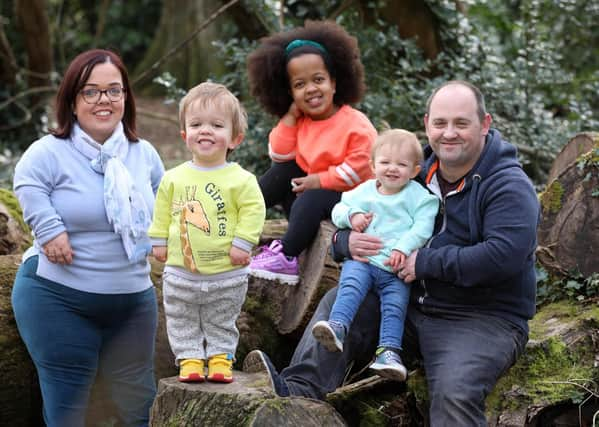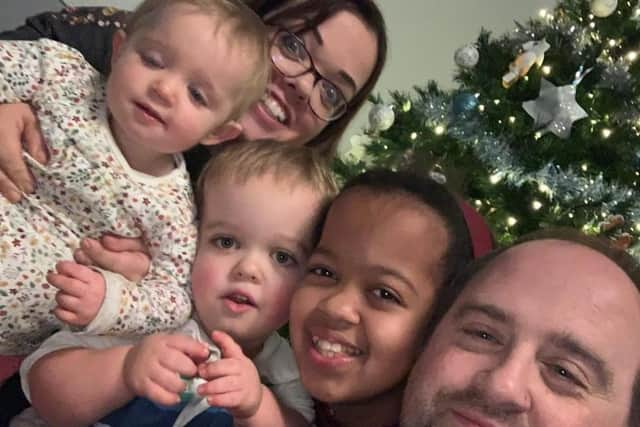The Carryduff family proving height is no obstacle to living life to the full


Tricia Mailey from Carryduff and her eldest two children, Cara and Noah, were born with the height-restricting condition achondroplasia, also known as dwarfism.
Despite their physical differences, Tricia and husband Sean, originally from Ballykelly, encourage their children to be who they want to be, although this can be challenging as the youngest family member, one-year-old Bethany, does not have achondroplasia and is almost the same height as her five-year-old brother Noah.
Advertisement
Hide AdAdvertisement
Hide AdSean said: “There is no difference between our family and any other family.


“We all have our jobs, our things to do during the day. The only difference is someone’s height.
“We try not to let it be an obstacle. We know that the world around us isn’t going to change, you have to adapt and get through it as best you can, work around it really.
“People are generally very accepting, sometimes you get a few looks in the street, but nothing to really worry about, it’s just something that people are getting used to with time.
Advertisement
Hide AdAdvertisement
Hide Ad“It’s pretty good in Carryduff, everybody knows Trisha, she’s been there all her life, it’s not an issue there.”
‘True North: Keeping Up With The Maileys’ followed the family of five across a six-month period, and from seaside trips to Christmas preparations, reveals what life is like for a little person in a world better suited to average-height people.
As a child Tricia wanted to be taller and at 11 she had surgery to lengthen her legs. She is well used to people staring at her but worries about the impact this will have on Cara and Noah as they grow up.
Like her mum, Cara is proud to be a little person, but being both mixed-race and small means she already gets a lot of unwanted attention.
Advertisement
Hide AdAdvertisement
Hide AdNoah has just started primary school and while aware he is smaller than his classmates, doesn’t fully understand his condition.
For Tricia’s mum Libby, finding out her newborn baby had achondroplasia came as a big shock and the cruel words of doctors at the time left her fearful for her daughter’s future.
Tricia though, has not let achondroplasia limit her ambitions and as a primary school teacher, encourages her pupils to accept we are all different and that being small does not define who a person is.
The documentary is filled with touching moments like when Trisha, who thought she’d never get married, recalls the moment Sean proposed to her.
Advertisement
Hide AdAdvertisement
Hide AdThere’s also the recollection of the strange shock when Sean and Trisha learned that their third child did not have achondroplasia.
Equally touching is Cara’s description of her younger brother Noah and when we see Trisha explain to her class about dwarfism during anti-bullying week.
Although dwarfism is genetic Sean said the vast majority of children with it are born to parents who don’t have it: “Neither of Trisha’s parents had it. We’re lucky we have a role model right there in Trisha for Cara and Noah. I think that’s something we really wanted to highlight in the show.
“People can find themselves in a situation where they have a child with achondroplasia, they don’t really know where to turn but there is a great support structure there within Northern Ireland.
Advertisement
Hide AdAdvertisement
Hide Ad“We’re in the DSA, the Dwarf Sports Association. Pre-Covid we’d have met up probably four or five times a year.
“Cara and Noah have all made great friends there. It’s great for them to see other people with the same condition as themselves and let them know that they’re not the only ones.
“At Noah’s school at the minute, he’s in primary one and he’s starting to come to the realisation that he’s smaller than everyone else.”
Explaining how the True North documentary came about Cara had been doing a programme for CBBC, and the guys who were making that suggested they would like to do a family one as well.
Advertisement
Hide AdAdvertisement
Hide Ad“Fingers crossed some people will watch it and get a bit of information from it, learn a bit about the condition, that it is not a barrier for people’s lives.”
In the documentary Trisha sums it up concisely, saying: “We’re small, that’s it, get over it.”
l ‘True North: Keeping Up With The Maileys’, is available on BBC iPlayer.